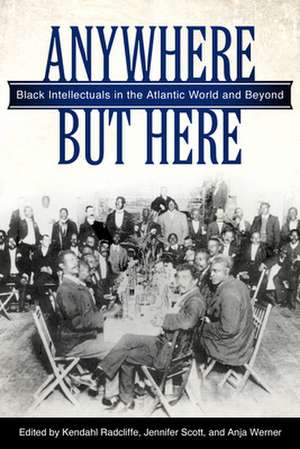Anywhere But Here
Editat de Kendahl Radcliffe, Jennifer Scott, Anja Werneren Limba Engleză Paperback – 30 iul 2017
Contributions by Keiko Araki, Ikaweba Bunting, Kimberly Cleveland, Amy Caldwell de Farias, Kimberli Gant, Danielle Legros Georges, Douglas W. Leonard, John Maynard, Kendahl Radcliffe, Edward L. Robinson Jr., Jennifer Scott, and Anja Werner
Anywhere But Here brings together new scholarship on the cross-cultural experiences of intellectuals of African descent since the eighteenth century. The book embraces historian Paul Gilroy's prominent thesis in The Black Atlantic: Modernity and Double-Consciousness and posits arguments beyond The Black Atlantic's traditional organization and symbolism. Contributions are arranged into three sections that highlight the motivations and characteristics connecting a certain set of agents, thinkers, and intellectuals: the first, Re-ordering Worldviews: Rebellious Thinkers, Poets, Writers, and Political Architects; the second, Crafting Connections: Strategic and Ideological Alliances; and the third, Cultural Mastery in Foreign Spaces: Evolving Visions of Home and Identity.
These essays expand categories and suggest patterns at play that have united individuals and communities across the African diaspora. They highlight the stories of people who, from their intercultural and often marginalized positions, challenged the status quo, created strategic (and at times, unexpected) international alliances, cultivated expertise and cultural fluency abroad, as well as crafted physical and intellectual spaces for their self-expression and dignity to thrive.
What, for example, connects the eighteenth-century Igbo author Olaudah Equiano with 1940s literary figure Richard Wright; nineteenth-century expatriate anthropologist Antenor Fermin with 1960s Haitian migr s to the Congo; Japanese Pan-Asianists and Southern Hemisphere Aboriginal activists with Jamaican-born Marcus Garvey; or Angela Davis with artists of the British Black Arts Movement, Ingrid Pollard and Zarina Bhimji? They are all part of a mapping that reaches across and beyond geographical, historical, and ideological boundaries typically associated with the "Black Atlantic." They reflect accounts of individuals and communities equally united in their will to seek out better lives, often, as the title suggests, "anywhere but here."
| Toate formatele și edițiile | Preț | Express |
|---|---|---|
| Paperback (1) | 275.78 lei 6-8 săpt. | |
| University Press of Mississippi – 30 iul 2017 | 275.78 lei 6-8 săpt. | |
| Hardback (1) | 648.02 lei 6-8 săpt. | |
| University Press of Mississippi – 30 dec 2014 | 648.02 lei 6-8 săpt. |
Preț: 275.78 lei
Nou
Puncte Express: 414
Preț estimativ în valută:
52.77€ • 55.10$ • 43.67£
52.77€ • 55.10$ • 43.67£
Carte tipărită la comandă
Livrare economică 05-19 aprilie
Preluare comenzi: 021 569.72.76
Specificații
ISBN-13: 9781496814647
ISBN-10: 1496814649
Pagini: 282
Dimensiuni: 152 x 229 x 16 mm
Greutate: 0.41 kg
Editura: University Press of Mississippi
ISBN-10: 1496814649
Pagini: 282
Dimensiuni: 152 x 229 x 16 mm
Greutate: 0.41 kg
Editura: University Press of Mississippi
Notă biografică
Kendahl Radcliffe has served as lecturer in the African American studies, history, and women's studies departments at the University of California, Los Angeles, and is professor of history at El Camino College, Compton Center. Jennifer Scott serves as faculty in the Museum and Exhibition Studies Graduate Program in the School of Art and Art History at the University of Illinois at Chicago and as assistant professor of anthropology at the New School for Public Engagement and at Parsons School of Art and Design History and Theory in New York. Anja Werner is a postdoctoral research associate at the Institute for the History and Ethics of Medicine at the Martin Luther University of Halle-Wittenberg, Germany. Among her major publications is The Transatlantic World of Higher Education: Americans at German Universities, 1776-1914.
Descriere
Brings together new scholarship on the cross-cultural experiences of intellectuals of African descent since the eighteenth century. The book embraces historian Paul Gilroy's prominent thesis in The Black Atlantic: Modernity and Double-Consciousness and posits arguments beyond The Black Atlantic's traditional organisation and symbolism.












